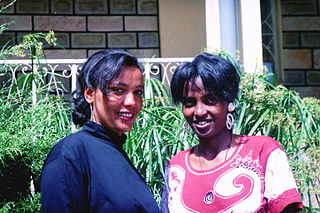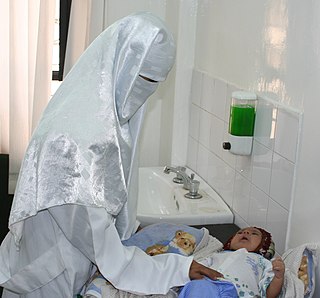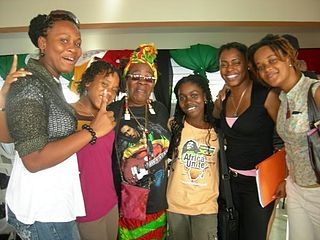Marital rape or spousal rape is the act of sexual intercourse with one's spouse without the spouse's consent. The lack of consent is the essential element and doesn't always involve physical violence. Marital rape is considered a form of domestic violence and sexual abuse. Although, historically, sexual intercourse within marriage was regarded as a right of spouses, engaging in the act without the spouse's consent is now widely classified as rape by many societies around the world, and increasingly criminalized. However it is repudiated by some more conservative cultures.

Sisters in Islam (SIS) is a Malaysian registered company committed to promoting the rights of women in Malaysia. Its efforts to promote the rights of Muslim women are based on the principles of equality, justice and freedom enjoined by the Quran. SIS work focuses on challenging laws and policies made in the name of Islam that discriminate against women. As such it tackles issues covered under Malaysia's Islamic family and sharia laws, such as polygamy, child marriage, moral policing, Islamic legal theory and jurisprudence, the hijab and modesty, violence against women and hudud. It is noted for its Islamic feminist research and advocacy.

Violence against women (VAW), also known as gender-based violence and sexual and gender-based violence (SGBV), is violent acts primarily or exclusively committed by men or boys against women or girls. Such violence is often considered a form of hate crime, committed against women or girls specifically because they are female, and can take many forms.
Equality Now is a non-governmental organization founded in 1992 to advocate for the protection and promotion of the human rights of women and girls. Equality Now works through public policy channels to create a just world for women and girls. Through a combination of regional partnerships, community mobilization and legal advocacy the organization works to encourage governments to adopt, improve and enforce laws that protect and promote women and girls' rights around the world.
Rape is a type of sexual assault initiated by one or more persons against another person without that person's consent. The act may be carried out by physical force, under threat or manipulation, by impersonation, or with a person who is incapable of giving valid consent.
The concept of rape, both as an abduction and in the sexual sense, makes its appearance in early religious texts.
Women's Aid Organisation (WAO) is a Malaysian non-governmental organisation that fights for women's rights and specifically against violence against women. It was founded in 1982 and continues to play a leading role in the Malaysian women's rights movement working within the fields of advocacy, public education as well as law and policy reforms.

There have been several studies concerning women in Ethiopia. Historically, elite and powerful women in Ethiopia have been visible as administrators and warriors. This never translated into any benefit to improve the rights of women, but it had meant that women could inherit and own property and act as advisors on important communal and tribal matters. As late as the first part of the 20th century, Queen Menen, consort of Emperor Haile Selassie I, had a decisive role in running the Ethiopian Empire. Workit and Mestayit regents to their minor sons have been held responsible for their provinces. They owed their rights to landed property because of a special type of land tenure that expected tenants to serve as militia to overlords, irrespective of gender. In 1896, Empress Tayetu Betul, wife of Emperor Menelik II, actively advised the government and participated in defending the country from Italian invasion. Prominent and other landowning women fought against the second invasion in 1935–41. With the assistance of European advisors, women in the ensuing period were kept out of the army and politics, even as advisors. Instead, they were restricted to family and household work of raising children and cooking. With a steady increase in female representation in education, they have started to undertake nursing, teaching, and other similarly supportive roles. Over the 2018–2019 period, their gradual participation in state politics has been increasing at a steady pace.

The status and social roles of women in Mali have been formed by the complex interplay of a variety of traditions in ethnic communities, the rise and fall of the great Sahelien states, French colonial rule, independence, urbanisation, and postcolonial conflict and progress. Forming just less than half Mali's population, Malian women have sometimes been the center of matrilineal societies, but have always been crucial to the economic and social structure of this largely rural, agricultural society.

Women in Yemen have historically been placed at a disadvantage due to their gender, with a highly patriarchal society. Although the government of Yemen has made efforts that will improve the rights of women in Yemen, many cultural and religious norms, along with poor enforcement of this legislation from the Yemeni government, have prevented Yemeni women from having equal rights to men.

Women in Malaysia receive support from the Malaysian government concerning their rights to advance, to make decisions, to health, education and social welfare, and to the removal of legal obstacles. The Malaysian government has ensured these factors through the establishment of Ministry of National Unity and Social Development in 1997. This was followed by the formation of the Women's Affairs Ministry in 2001 to recognise the roles and contributions of Malaysian women.
Punishment for rape in Pakistan under the Pakistani laws is either death penalty or imprisonment of between ten and twenty-five years. For cases related to gang rape, the punishment is either death penalty or life imprisonment. DNA test and other scientific evidence are used in prosecuting rape cases in Pakistan.
Prosecution of gender-targeted crimes is the legal proceedings to prosecute crimes such as rape and domestic violence. The earliest documented prosecution of gender-based/targeted crimes is from 1474 when Sir Peter von Hagenbach was convicted for rapes committed by his troops. However, the trial was only successful in indicting Sir von Hagenbach with the charge of rape because the war in which the rapes occurred was "undeclared" and thus the rapes were considered illegal only because of this. Gender-targeted crimes continued to be prosecuted, but it was not until after World War II when an international criminal tribunal – the International Military Tribunal for the Far East – were officers charged for being responsible of the gender-targeted crimes and other crimes against humanity. Despite the various rape charges, the Charter of the Tokyo Tribunal did not make references to rape, and rape was considered as subordinate to other war crimes. This is also the situation for other tribunals that followed, but with the establishments of the International Criminal Tribunal for the former Yugoslavia (ICTY) and the International Criminal Tribunal for Rwanda (ICTR), there was more attention to the prosecution of gender-targeted crimes with each of the statutes explicitly referring to rape and other forms of gender-targeted violence.

Women in Trinidad and Tobago are women who were born in, who live in, or are from Trinidad and Tobago. Depending from which island the women came, they may also be called Trinidadian women or Tobagonian women respectively. Women in Trinidad and Tobago excel in various industries and occupations, including micro-enterprise owners, "lawyers, judges, politicians, civil servants, journalists, and calypsonians." Women still dominate the fields of "domestic service, sales, and some light manufacturing."

The feminist movement in Malaysia is a multicultural coalition of women's organisations committed to the end of gender-based discrimination, harassment and violence against women. Having first emerged as women's shelters in the mid 1980s, feminist women's organisations in Malaysia later developed alliances with other social justice movements. Today, the feminist movement in Malaysia is one of the most active actors in the country's civil society.
Violence against women in Pakistan, particularly intimate partner violence and sexual violence, is a major public health problem and a violation of women's human rights in Pakistan. Women in Pakistan mainly encounter violence by being forced into marriage, through workplace sexual harassment, domestic violence and by honour killings.
Traditional gender roles in Egypt are prevalent and clearly defined. These roles are largely associated with traditional Islamic family structures, wherein women's roles are closely tied to the domestic sphere and men's roles tied to the public sphere. Gender roles are based on assumed biological differences between the sexes and can lead to dramatically different life experiences as well as opportunities and outcomes for individuals. Consequently, when looking at a number of indicators, women often find themselves disadvantaged relative to men.
Violence against women is an entrenched social problem in Ukrainian culture engendered by traditional male and female stereotypes. It was not recognized during Soviet era, but in recent decades the issue became an important topic of discussion in Ukrainian society and among academic scholars.
The All Women's Action Society (AWAM) is a feminist non-profit organization based in Malaysia. The organization was established in 1985 following a workshop held by the Joint Action Group. The group works on a local and national level to empower women and bring about social policy change.
A marry-your-rapist law, marry-the-rapist law, or rape-marriage law is a rule of rape law in a jurisdiction under which a man who commits rape, sexual assault, statutory rape, abduction or other similar act is exonerated if he marries his female victim, or in some jurisdictions at least offers to marry her. The "marry-your-rapist" law is a legal way for the accused to avoid prosecution or punishment.







